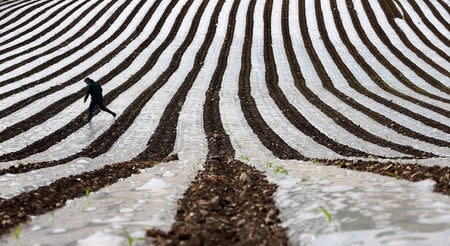Minister seeks big changes to farm policy post-Brexit
By Nigel Hunt BIRMINGHAM, England (Reuters) - Britain's farm policy is set for a major shake-up when the country leaves the European Union because the current system is poor value for money, has too much red tape and provides few incentives to use the latest technologies, farming and environment Secretary Andrea Leadsom said on Tuesday. Leadsom said she was meeting with the ministers of Britain's devolved administrations - Scotland, Wales and Northern Ireland - on Thursday and would be holding talks throughout March and April to hear views on how farm policy should be transformed. "We have a once in a generation opportunity to transform our food and farming policies," she told the National Farmers Union's annual conference. Britain's vote last year to leave the EU has created uncertainty about future government support for agriculture, access to key markets and how the sector will be regulated. EU farmers receive an annual payment under the Basic Payment Scheme (BPS). Leadsom said that for some UK farmers this payment accounted for 70 percent of their bottom line. The government has guaranteed that these payments will continue until 2020 but the future beyond then is unclear. "There is no doubt that there will be support for our vital food and farming industry after we leave the EU. But I'm not going to pre-empt the work the government is doing to get the best possible deal for the UK," she said. Leadsom said Britain was looking to build new partnerships and strike the best free trade deals for Britain while noting that 60 percent of exports go direct to the EU. "The EU is our most important trading partner, a fact that won't change when we leave, and a relationship we are determined to uphold," she said, adding Britain was seeking tariff-free trade with Europe. NFU president Meurig Raymond said a trade deal with the EU was "the first of our vital ingredients for farming's success", noting Britain exports about three times more food to Belgium than to Brazil, Russia, India and China combined. "No one will thank a government for doing bad deals with new partners quickly, at the expense of keeping longstanding, good deals alive," he said. Raymond also said farming in Britain needed access to a competent and reliable workforce. "Without a workforce, permanent and seasonal, it wouldn't matter what a new trade deal looks like, the lights would go out in our biggest manufacturing sector, food will rot in the fields and Britain will lose the ability to produce and process its own food," he said. Leadsom said the government was aware of the industry's needs and was looking at the issue. (Reporting by Nigel Hunt. Editing by Jane Merriman)

 Yahoo News
Yahoo News 

